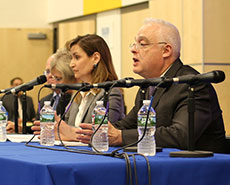Benjamin Forman, MassINC research director, said Gateway Cities, such as Haverhill, are disadvantaged because they must rely on a predominantly residential property tax base, rather than a commercial one. (Photographs by Cindy Driver for WHAV News.)
Participants in a “Haverhill Community Discussion on School Success” last night all appeared to arrive at the same conclusion—Haverhill must spend more money on its schools.
While no specific solutions, such as raising taxes or rearranging the city budget, were proposed, a common theme emerged that the city must pay more. Economist Thomas Granneman, a senior fellow with Mathematica Policy Research, Cambridge, zeroed in on what he thinks is the real problem.
“We need to keep taxes and spending low until the Hale debt is paid off—something we hear often. Or, we need to keep taxes low because some citizens cannot afford to pay them. So, that would be accepting the kind of, what I would call, the culture of scarcity that’s been the predominant mode of thinking in many discussions in Haverhill.”
Instead, Granneman said, residents need to adopt a “culture of civic responsibility.” He explained the failure of the former city-owned Hale Hospital should not be a problem faced only by current students.
“Low taxes will not make the Hale debt go away—sometimes, you seem to hear that. The burden of the Hale debt should not be placed on this generation of Haverhill students.”

Haverhill Mayor James J. Fiorentini did not participate in the forum. He watched from the audience.
Granneman pointed to a variety of statistics showing Haverhill’s student dropout rate is higher than other Gateway Cities—former industrial communities—and other similar-income cities. The city also spends less.
“Over the last 10 years—a period of relatively tight budgets and what not—Haverhill spending has drifted downward to where it’s substantially below, in 2015 (numbers), the other benchmark cities that we’re looking at.”
He suggested inconsistent student performance over time can be blamed on the city’s reliance on short-term grants. He explained gains the city makes while using grant money are lost when the money runs out. However, Granneman said, improvement is possible with consistent spending and pointed to schools in Salem and Lawrence as examples. While the city does spend more every year, he said, the hikes have not kept up with increasing student enrollment and inflation. He estimated Haverhill needs to spend 7.4 percent every year for the next five years to match other Gateway Cities, or 8.5 percent more to match similar income Gateway Cities. Haverhill currently spends 18 percent less per student than the state average.
Wish Lists

City Council President John A. Michitson said the city council could do a better job of “horse-trading” with Mayor James J. Fiorentini.
In a segment moderated by Northern Essex Community College President Lane Glenn about solutions, School Committee President Gail M. Sullivan listed her wish list.
“What I’d like to see different is more cooperation, more collegiality and more systemic planning so that things are systems-based.”
Similarly, Haverhill City Council President John A. Michitson blamed the city charter for tying the hands of city councilors. He explained the legislative body cannot add money to budgets, interfere with individual items within the school budget or manage the city. However, he added, the council could do a better job of “horse-trading” with Mayor James J. Fiorentini. As an example, Michitson noted efforts last year to convince the mayor to spend more on schools.
“We weren’t strong enough to get that additional funding, but we gave it the old college try, and hopefully we’re going to try harder this time around,” Michitson said.
He said the council did lead a successful fight to submit a plan to the state for help fixing Consentino School and continues to push for improvements at Tilton School.
Panelist Dena Papanikolaou, chief legal counsel for the state Board of Higher Education, spoke as a resident. Whether it’s in the school budget or not, she said, taxpayers are already paying for the failures of the education system.
“For each high school dropout, this costs taxpayers about $290,000 over each high school dropout’s lifetime,” she said.
She cited examples such as the costs of public assistance or placing people in prisons.
“When people say we cannot afford to reallocate resources or to raise new revenue to address these issues by investing upfront in our education system, I say, ‘Guess what? We’re already paying for it, but we’re paying for it in a reactive way.’”
Benjamin Forman, MassINC research director, hinted at another problem faced by Gateway Cities such as Haverhill.
“Boston gets two-thirds of its tax base from commercial properties. Our Gateway Cities get two-thirds of their tax base from residential property,” Forman said.
WHAV broadcast the forum live on 97.9 FM from Hunking School. Tim Jordan, of the Haverhill Education Coalition, introduced each of the speakers. A rebroadcast of the forum is scheduled to take place in the near future.

The schools do need more money, but before there is more money spent we need a school committee that is willing and able to hold the superintendent accountable.
Remember when passage of the Affordable Care Act, otherwise known as Obamacare, was up for vote before Congress and Nancy Pelosi made the now famous comment….”We have to pass this bill so you can find out what’s in it”?
This is how liberal democrats think. They just want to raise taxes and increase spending with no factual justification for the increases, or if the spending will actually provide a proven result.
I just love hearing crazy liberals with a socialist mentality try to explain fixing the very societal problems that their own ideological public policies created in the first place. Residents need to adopt a “culture of civic responsibility” do they? What happened to individual responsibility? No amount of money is going to better educate people who don’t want or care to be educated. But somehow as a community if we just give “government” more money they will be able solve this issue. It’s utter insanity.
The “culture of scarcity” exists in Haverhill because the mayor and city officials have made public policy decisions which have lead it into a financial abyss. Competing liberal ideological issues are driving the city (and country) into financial ruin. Every time the liberal mayor adds low income housing to the city he adds demand for more school resources. Every time the mayor welcomes criminal trespassers in this country illegally to the city and the dozens, possibly hundreds, of children they bring, he adds demand for more school resources. When the mayor creates meals taxes and parking taxes and raises fees on all city services and drives businesses out of the city or keeps them from locating here, he limits revenue growth.
It’s guaranteed that taxes are going up in Haverhill. The city is run by liberal Democrats who believe that taxing and increased spending solves ALL problems. The ONLY way for Haverhill citizens to stop taxes from going up is to vote these people out of office. If you continue to elect these people with their liberal tax and spend mentality and your taxes go up you have no one to blame but yourself.
Who knew that a group of far-leftist were here pitching a money grab?
Some of us here knew. Exactly what we thought would happen..did. The Mayor, to his credit, has managed the city during a very difficult economical time having to deal with a $100 million albatross around the city’s neck. What I find interesting is that these folks are clueless. Look at the statement about where cities get their tax revenue: “Benjamin Forman, MassINC research director, said Gateway Cities, such as Haverhill, are disadvantaged because they must rely on a predominantly residential property tax base, rather than a commercial one.” One thing you may not realize is that Lawrence has only ONE industrial park. Haverhill has FIVE industrial parks. Haverhill is very unique in that is has so many commercial areas to generate tax revenue. Other cities would kill for what we have. Please, spare us the crocodile tears about funding. The revenue is there unless you wish to depend on Federal and state monies like Lawrence does. Wait, we already get some of that money even though we do not tax at the full levy limit. Is that your point maybe ?
Haverhill has been horrible in managing the city for decades now. Just ask those financial gurus in Boston, they know the truth. The city was told to sell the Hale hospital way back when we would not have been saddled with all the debt. But no, they refused to sell it due to the cries from residents, and of course those with political cushy jobs there. These residents had a valid concern but city leaders took the “emotional” route, not the fiscally responsible route. Then, not keeping a fiscal eye on the management company, Quorum, allowed the financial fiasco to fester to the point of almost default. So, why should the residents pay even more money when we were not responsible for the total mismanagement of the city’s finances ? Why didn’t anyone go to jail over this situation ? We would have been charged with fraud ? Where was the investigation ? Yes, right, too many politically connected people involved int he fraud.
Why not stop building and change the zoning as one poster said here last week ? Why keep adding housing and stuffing more and more kids into a school system that has such serious issues then ? Why not call for a moratorium on new large residential housing complexes ? Why is it always about raising taxes ? Why not lower spending in other areas ? Why not recommend an full audit of our finances ? Why ? Because it is easier just to say raise taxes and take more of our money to dump into a failed system. People, have you had enough yet ?
Jack, did you see the 225 housing unit complex Sal Lupoli is proposing to build in Andover? He hopes to build 225 residential units … 75 will be dedicated to people over 55, 75 will be one bedroom apartments and another 75 studios units. These types of units don’t attract families which add to a burden to the school system. It’s a smart public policy decision which increases city revenues while at the same time stimulates private business economic activity.
Mayor Jimmy uses low income housing to promote his liberal mentality of “government” providing for those who can’t provide for themselves. At the same time he increases the democrat ranks in the city of those who are guaranteed to vote for him.
No, I did not know that. But you are correct about the low income housing.I don’t see Andover teeming with low income housing units like Haverhill is.
Thank all the astute folks leading the charge to investing in education in Haverhill. Our students and City deserve
To to at the top of the State’s school
Education rating and not near the bottom. Top notch education brings in new residents that seek jobs and housing. Our current administration should have been aware of this and I’m so happy this panel was able present facts and figures to prove it. Now let’s see if out Mayor and Superintent will listen. With all the recent development downtown and around the City we should be marketing education and creative placemaking as City strengths !